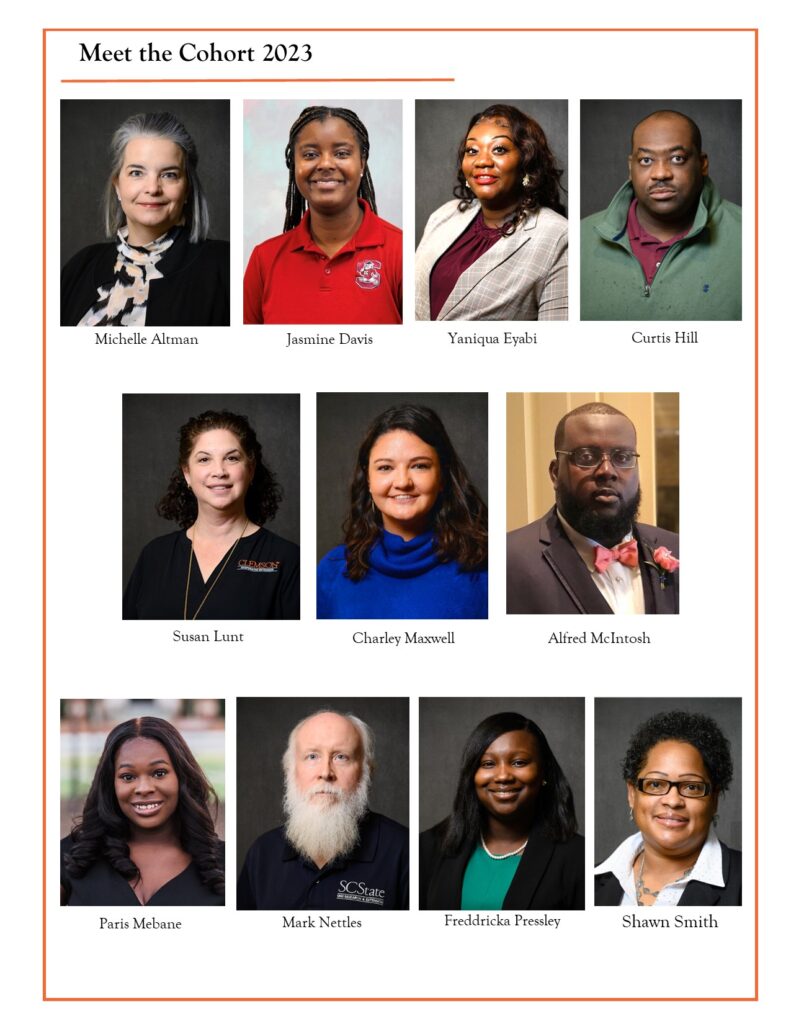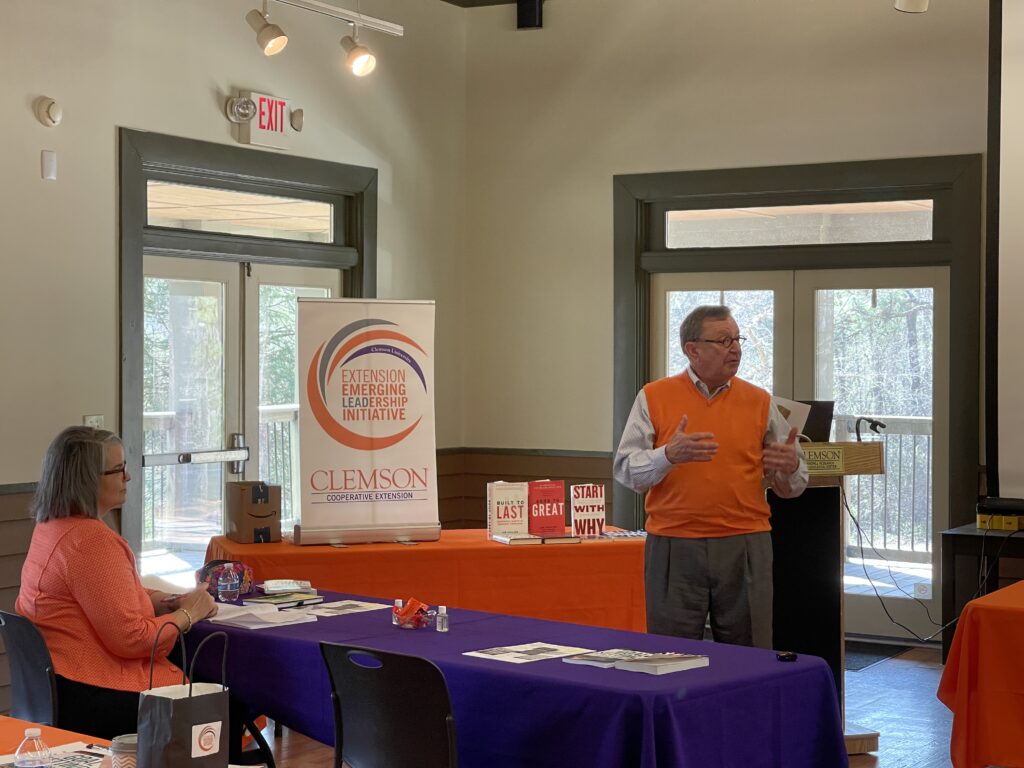With the program now on its third cohort, the Extension Emerging Leadership Initiative (EELI) welcomed back graduates to help usher in a new class by sharing their own stories of success since completing the leadership training.
“The best part of my experience with EELI had to be the camaraderie within our group, meeting and getting to know the other Extension professionals,” said Senior Agribusiness Extension Agent Will Culler, a 2020 graduate. “It may sound obvious, but you don’t know all the other agents across the state. You may have heard of them, you may have seen them or know what they do, but you haven’t had a chance to really get to know them and get comfortable — and that helps you be a team.”
Food Systems and Safety Agent Faith Israel said it was invaluable to hear and share stories with others who’d faced similar challenges or overcome similar problems to ones she had also encountered in her career.
“Just hearing their experiences — for example, a time when they had a tough situation with a coworker or had to have an uncomfortable conversation — and how they handled that, just helped me to prepare for, ‘OK, how can I handle this if it ever happened to be?’” she said. “Because I like to learn new things, but I can’t learn everything myself. So, I think just hearing that — their stories, their journeys and how they work with their communities — was very beneficial.”
After participating in the President’s Leadership Institute, Clemson Extension Director of Field Operations and Personnel Management Deon Legette was inspired to develop a similar program for Clemson Cooperative Extension personnel. Two years later, Legette was awarded the prestigious Martin Luther King Jr. Award for Excellence in Service by the President’s Office and the Division of Inclusion and Equity at Clemson University.

EELI is a professional development opportunity that each year selects up to 25 professionals who are either at the county or state level with a minimum of three years of experience with Extension aimed at developing the next generation of leaders. But this third cohort has a smaller class size to allow for more individual interaction, and the 11 members includes employees from Clemson and South Carolina State.
“This cohort will be charged with leading the way to make sure that the three C’s from the first joint South Carolina Cooperative Extension conference theme are carried out — Coordination, Collaboration, Cultivation — at both universities through planned programs, administrative meetings, and other partnerships,” Legette said. “We are going to be the leading force in promoting this coordination, collaboration and cultivation between Clemson and South Carolina State.”
Clemson Extension Director Tom Dobbins praised Legette not only for the vision to conceive of such a program for Extension, but also for providing the initiative and leadership to bring it to fruition.
“Deon is helping to create a culture of success and is helping Extension agents and associates reach their full potential,” he said. “The EELI participants are making a huge difference in our organization, and I am very grateful to Deon for all her hard work on this.”
Alfred McIntosh, program coordinator for 1890 Research & Extension Community Economic Development Program, said one of the primary things he has taken from program thus far has been inspiration.
“I have gained a greater sense of purpose and service in outreach and Extension,” McIntosh said. “This program is not only contributing to my professional growth, but also enhancing my personal growth. As a professional whose work requires making a difference in people’s lives and their communities, I hope to translate the skills gained from attending EELI into my work environments to keep learning and growing.”
One thing that cohort members and previous graduates consistently mention when asked of the program’s benefits is simply the relationships and connections it allows them to build with other Extension professionals in the state.
“There are many things I hope to take away from this experience such as learning to lead from where I am, strengthening and stretching my leadership skills and abilities, and the relationships with other Extension leaders, especially those in my cohort. I expect this process to afford opportunities that will allow me to gain valuable knowledge and experiences that will enhance my skill set to further my service to my community,” McIntosh said.
Clemson Extension Water Resources Agent Susan Lunt described her experience with EELI as “phenomenal” and said it focused on holistic growth — not just of the professional variety.
“This program is helping me to synthesize my individual mission and passion both personally and professionally and see how it aligns with Clemson Extension,” Lunt said. “The emphasis this program puts on you as an individual to grow and make connections with others in the cohort builds relationships, focus and confidence. The result of my involvement in EELI will be to seek opportunities that will allow me to realize and achieve my potential and to help others to do the same.”

Family Health and Nutrition Agent with 1890 Extension Yaniqua Eyabi said she has gained knowledge and learned that her ‘why’ — what drives her to serve others professionally — describes why she does the work she does and the difference she can make.
“I hope to discover more about myself so I can design a lifestyle that enables me to keep challenging myself and gain new perspectives about myself throughout EELI,” Eyabi said. “I hope I have taken the proper steps to grow as a professional because thus far I have set clear goals, I am expanding my network, I am working on finding a mentor and supporter, and I am continuously perfecting my ‘why’ to grow as a professional.”
The Morrill Act of 1862 was enacted during the American Civil War and allowed for the creation of land-grant colleges such as Clemson in U.S. states, while the second Morrill Act of 1890 expanded the model to include the 1890 land-grant institutions such as SC State and other historically Black universities.
Clemson Extension has offices in all 46 South Carolina counties, while S.C. State has offices in 32 counties and counting as it continues to expand its footprint. And the education of EELI goes all the way back to the roots of Extension: at the February meeting, Frank Lever III, grandson of A. Frank Lever, the legislator responsible for passing the Smith-Lever Act that established Extension services across the country.
Extension serves as the outreach arm of an institution’s three-pronged land-grant mission — of education, research and outreach — to improve the quality of life of all South Carolinians by providing unbiased, research-based information through an array of public outreach programs.
Clemson Extension Area Agribusiness Agent Charlotte Maxwell, based in Horry, Georgetown and Williamsburg counties, said the EELI program had helped her to understand how the state’s entire Extension system operates as a cohesive whole.
“I applied to be in this EELI cohort to better understand the intricacies of the South Carolina Extension system and to prepare myself for future leadership roles,” Maxwell said. “I am hoping to take away new connections and more confidence in leading from where I am at the end of the program. Thus far, I have met colleagues from different counties and program areas and have started to refine my understanding of leadership and teamwork.”
An EELI reunion is planned with all three cohorts. The reunion will include leadership professional development, a service project and a collaborative effort with Clemson and S.C. State.
Speaking to the cohort at the March meeting, Clemson University President James P. Clements issued words of encouragement to the Extension professionals: “What you do is incredible. You change lives. You impact the state. You have built trust — not just for whatever your title is or whatever your role is or whatever you think your job is,” he said. “You are a resource to people who trust you.”
Get in touch and we will connect you with the author or another expert.
Or email us at news@clemson.edu

